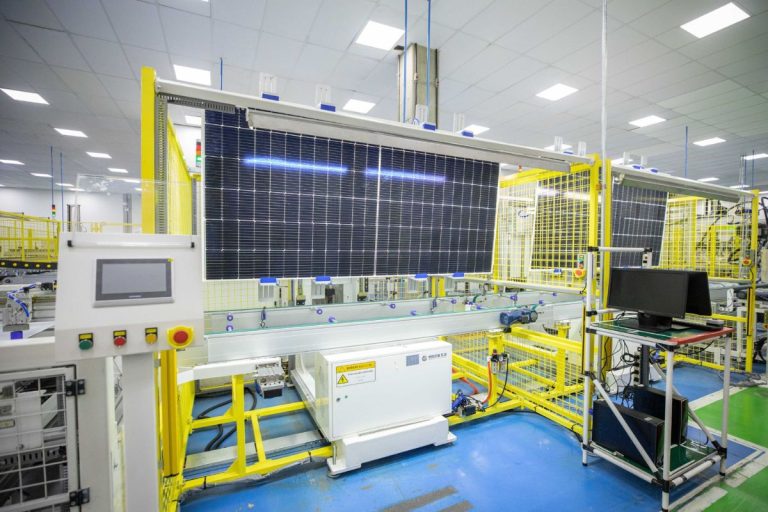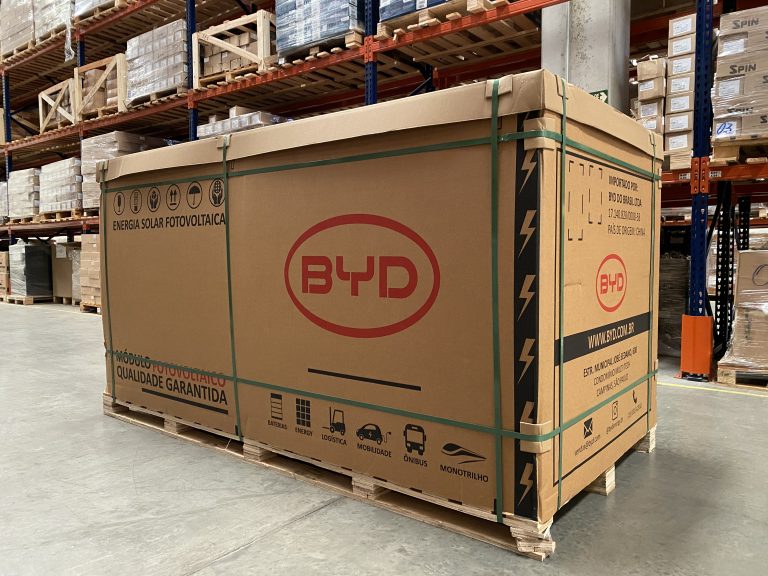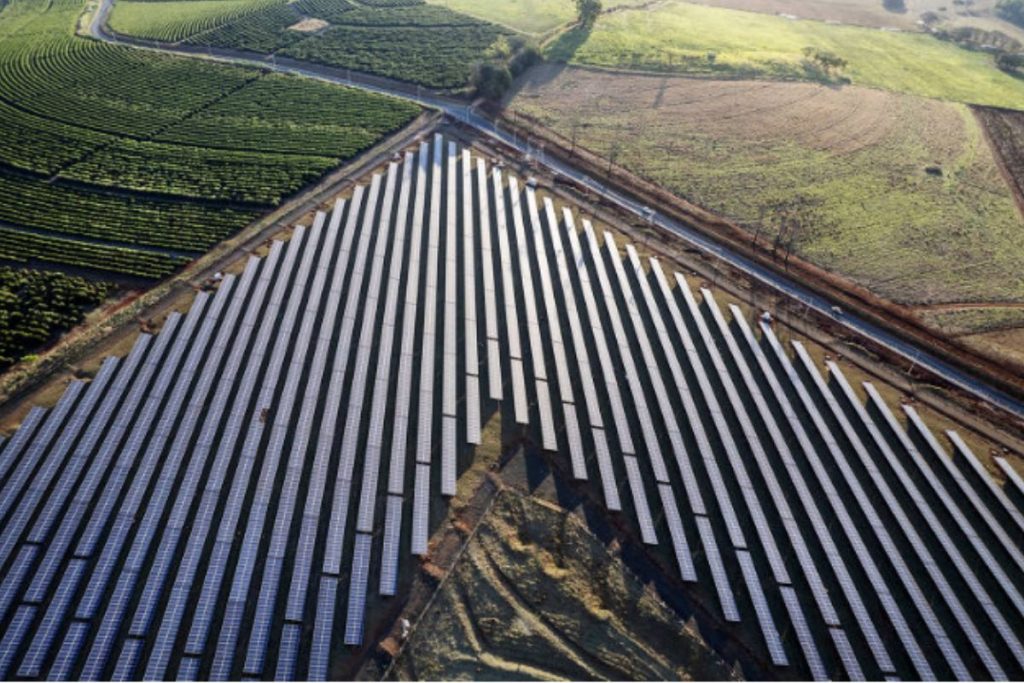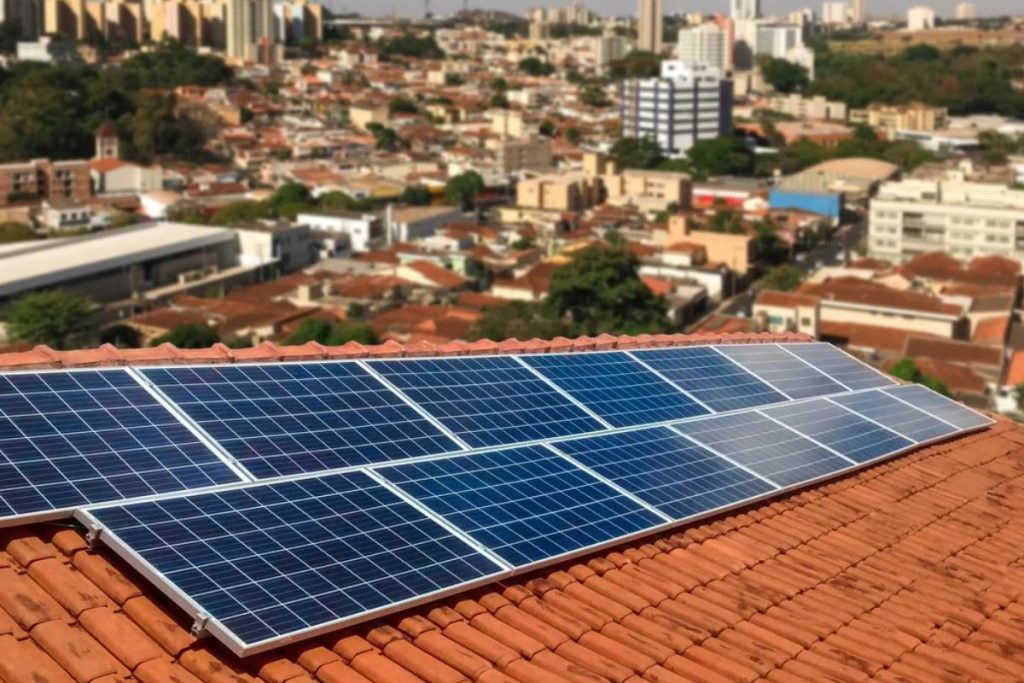A stationary battery is the heart of the solar energy system, storing the sun's energy for use at night, on cloudy days or in emergency situations.
More than just a component, the stationary battery represents the key to energy autonomy, allowing you to make the most of your investment in solar energy and free yourself from worries about electricity bills and energy security.
In this article, we'll find out all about how stationary batteries work, the different types available, their benefits and how to choose the ideal option for your business. project.
What is a stationary battery and how does it work?
The stationary battery is an electrochemical device that specializes in storing electrical energy in a stable and efficient way, designed for applications that require a continuous and reliable supply of energy, such as solar energy systems or photovoltaic kits.
Unlike automotive batteries, optimized to deliver high peak currents for short periods to drive starter motors, or portable batteries, designed to power mobile electronic devices, stationary batteries are built to withstand deep and repetitive charge and discharge cycles.
This makes them ideal for storing excess energy generated by solar panels during the day for later use, such as at night or during periods of low sunshine.
Operation in the context of solar energy
In a photovoltaic system, the solar modules convert the sun's light energy into electrical energy (direct current - DC).
This energy is then directed to the stationary battery, where it is stored. The process of charging and discharging the battery is managed by a charge controller.
This device ensures that the battery is charged efficiently, avoiding overcharging which can damage the battery. battery and reduce its useful life.
Likewise, the charge controller also protects the battery against excessive discharges, which can lead to permanent damage.
When the energy stored in the battery is needed (for example, at night), the charge controller releases the energy in a controlled manner to power the electrical devices.
In more sophisticated systems, an inverter converts the battery's direct current (DC) into alternating current (AC), which is the standard used in most homes and businesses.
Key features
Stationary batteries are distinguished by a number of characteristics that make them suitable for solar energy:
- DurabilityStationary batteries: designed to withstand long periods of continuous use and a wide range of weather conditions, stationary batteries maintain their performance over time, ensuring a reliable power supply for many years.
- Load capacity: stationary batteries can store large volumes of energy, measured in kilowatt-hours (kWh), allowing the storage system to be precisely sized to meet the specific needs of each installation.
- Life cycles: the number of life cycles of a battery refers to the number of times it can be charged and discharged before its storage capacity begins to decrease significantly.
High-quality stationary batteries, such as lithium-ion batteries, offer thousands of life cycles, providing an excellent return on investment in the long term.
With these characteristics, these stationary batteries guarantee autonomy and reliability in solar energy systems, allowing users to make the most of the renewable energy generated by solar panels.
Types of stationary batteries
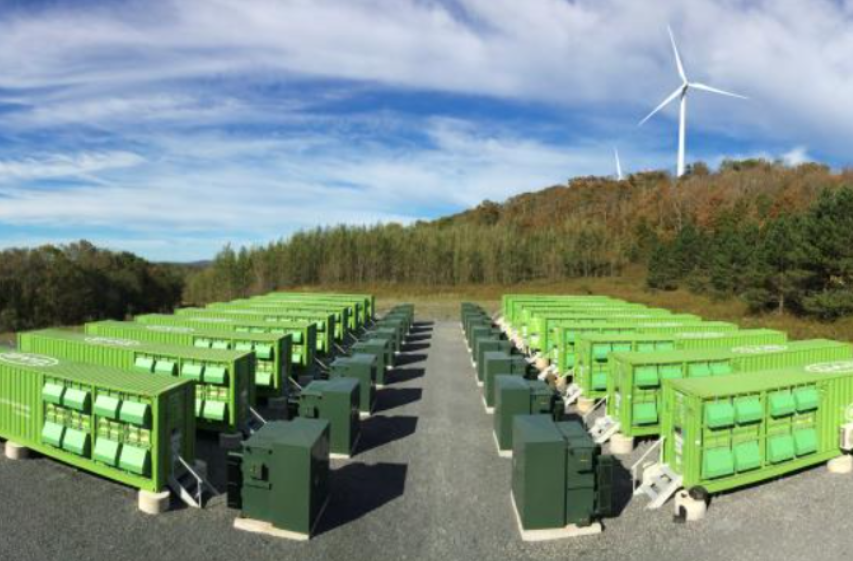
Choosing the ideal stationary battery for solar energy systems is crucial and depends on several factors, including budget, energy needs and durability expectations.
Each type of battery has specific characteristics, advantages and disadvantages that deserve a detailed analysis.
Lithium-ion batteries
Lithium-ion batteries represent the state of the art in energy storage technology for solar systems.
The Lithium Iron Phosphate (LiFePO4) model stands out for combining efficiency, durability and safety. Its main features include:
- High energy density: make it possible to store and release large amounts of energy efficiently, minimizing losses and maximizing system performance.
- Long service life: withstand thousands of charge/discharge cycles without significant degradation, providing a much longer service life than lead-acid batteries.
- Low maintenance: practically maintenance-free, offering great convenience and reducing operating costs.
- Security: LiFePO4 technology is intrinsically safe, with a low risk of overheating and fire.
Although the initial cost is higher, the long service life, high efficiency and low maintenance of lithium-ion batteries often justify the investment, especially for those looking for a reliable, high-performance solution over the long term.
How to choose a stationary battery?
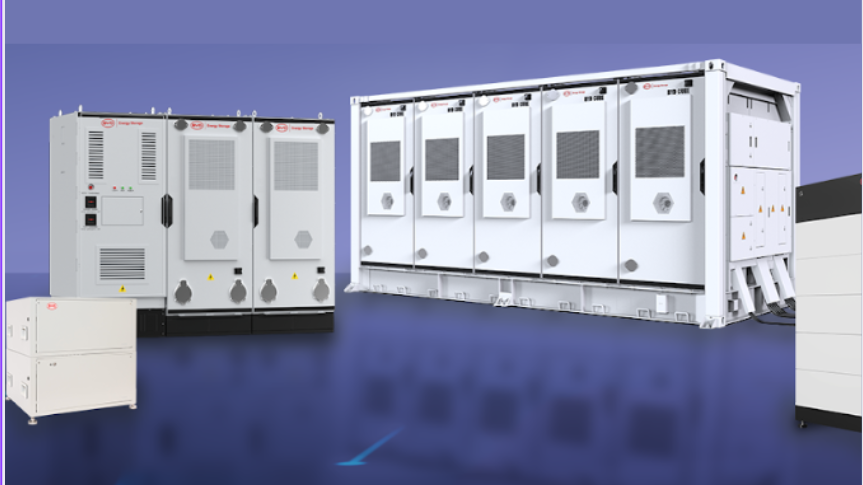
Choosing the right stationary battery for your solar energy system is a complex decision that requires careful evaluation of several factors that directly impact the performance and total cost of the installation.
The careful choice of battery will ensure maximum use of the energy generated by the solar panels, whether for residential, commercial or remote applications.
Let's understand the main criteria to be taken into account in this selection process.
Storage capacity
Storage capacity, measured in kilowatt-hours (kWh), is the first factor to be analyzed. It determines how much energy the battery can store.
To define the ideal capacity, it is important to calculate your daily energy consumption and estimate the number of hours of autonomy you want, i.e. the time the system should operate without solar generation.
For example, to supply night-time consumption with an average expenditure of 6 kWh per day, the battery must have a capacity equal to or greater than this demand, such as the BYD Battery-Box Premium LVS 8.0 or BYD Battery-Box Premium HVM 8.3.
Life cycles and durability
The life cycle of a battery represents the number of times it can be charged and discharged before its storage capacity decreases significantly.
Lithium-ion batteries generally offer a longer service life compared to lead-acid batteries.
Although batteries with a higher number of life cycles may have a higher initial cost, their superior durability pays off in the long term, especially in systems designed to operate for many years.
In a home, for example, a lithium-ion battery can be more cost-effective in the long term than a lead-acid battery.
For companies that need a long-lasting solution, choosing batteries with a high life-cycle capacity is even more advantageous.
Inverter compatibility
Another important consideration is compatibility with inverters. O inverter is the equipment responsible for converting the direct current (DC) generated by the solar panels into alternating current (AC), which is used in most homes and businesses.
It is essential to check the compatibility between the battery and the inverter before purchasing, as not all batteries are compatible with all inverter models.
In solar systems for remote areas, where solar energy is the main or only source of electricity, compatibility between batteries and inverters is crucial to ensure that your system works efficiently and without fail.
Stationary batteries and off-grid systems
Stationary batteries are essential components in off-grid solar systems, i.e. those that operate independently of the conventional electricity grid.
They act as real energy stores, capturing and storing the surplus generated by the solar panels during the day.
This stored energy ensures that electricity is supplied even when there is no sunlight, such as at night or on cloudy days.
This feature is especially valuable in remote areas where access to the electricity grid is limited, unstable or non-existent.
How batteries ensure autonomy in off-grid locations
In off-grid locations, such as rural homes, sustainable sites or isolated properties, the combination of solar energy with stationary batteries, such as BYD batteries, offers an efficient, reliable and sustainable energy solution.
During the day, the panels convert sunlight into electrical energy, which is directed by charge controllers to the batteries. With their cutting-edge technology and high energy density, BYD batteries store excess electricity efficiently.
When solar irradiation decreases or ceases, the batteries come into play, releasing the stored energy in a controlled manner and powering the home's equipment, such as lighting, household appliances, water pumps and heating systems.
The advanced battery technology guarantees a stable and reliable energy supply, without interruptions or fluctuations.
Application in rural and sustainable environments
In rural homes, where connection to the electricity grid can be expensive or unfeasible, a solar system with stationary batteries guarantees energy autonomy.
A house in the countryside can depend on solar energy for various purposes, such as lighting, cooling and operating agricultural tools and equipment.
With a stationary battery, the solar energy captured during the day is stored and used to keep these systems running continuously, even at night or on cloudy days.
In sustainable sites, which seek to minimize their environmental impact and achieve self-sufficiency, stationary batteries play an even more crucial role.
These sites generally use renewable energy for various applications, such as powering homes, irrigation systems, heating water and even charging electric vehicles.
BYD batteries, with their long service life and high efficiency, such as the Battery-Box Premium LVSThis ensures reliable storage of renewable energy, contributing to the sustainability and energy independence of the site.
The sustainable future with stationary batteries
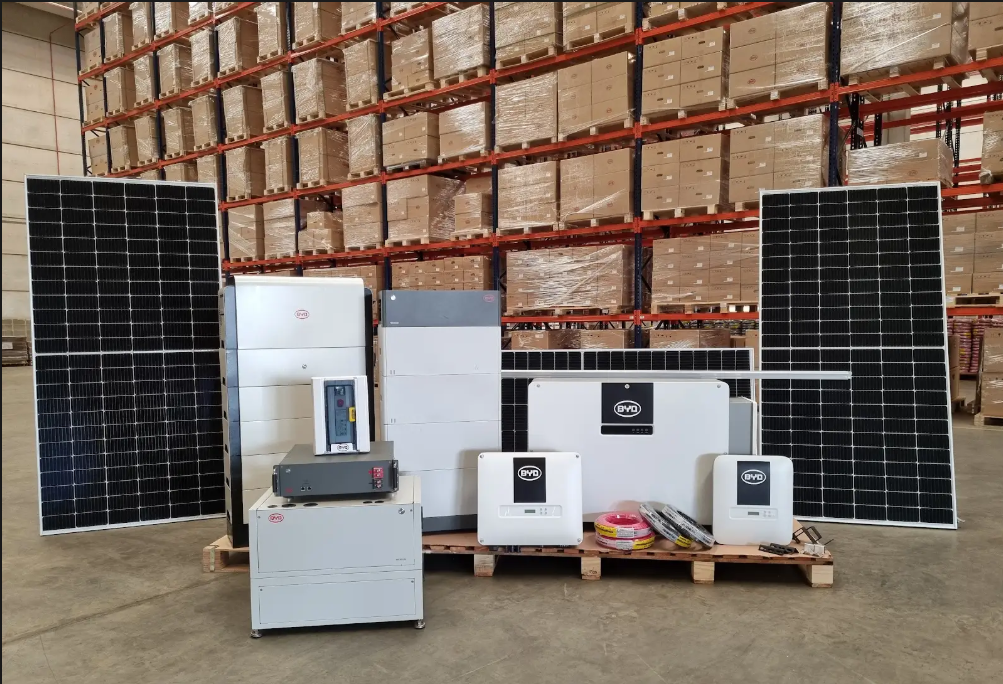
Stationary batteries are essential for transforming the way we manage solar energy, allowing us to store the electricity generated by solar panels and use it when we need it most.
They are the key for anyone who wants not only to save money in the long term, but also to contribute to a more sustainable planet by reducing dependence on non-renewable energy sources.
BYD stands out in the stationary battery market for its innovative technology, high quality and reliability.
BYD batteries are designed to offer high performance, long life and safety, meeting the needs of various types of applications, from rural homes to large off-grid projects.
By choosing BYD batteries, you invest in a complete energy solution that guarantees autonomy, economy and sustainability for your off-grid solar system.
With BYD stationary batteries, you can guarantee the autonomy and reliability of your off-grid solar system, enjoying clean, renewable energy whenever you need it.
If you're ready to take a step towards a more sustainable future, get to know BYD batteries and find out how they can improve your solar energy experience.




